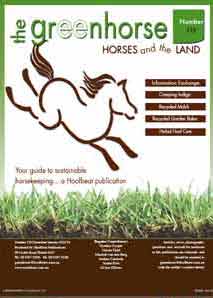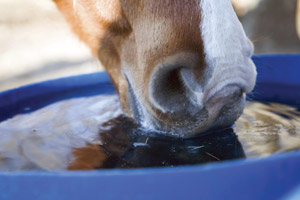The Green Horse section provides practical information on managing environmentally sustainable horse properties, readers stories and tips, as well as advice and articles from equestrian experts in their fields.
December/January 2015
Vol 37 No 4
In this issue of The Green Horse you will find the following articles:
Information Exchange - Make Your Own- natural fly repellent; Getting Dirty can be Healthy
Creeping Indigo
Stable Bedding
by Andrea Carmody
Get that Grass Growing Recycling Lawn Corings:
Bushfire- time for a reminder.
Recycling Ideas for Christmas Decorations and presents.
Recycled Garden Bales
Dung Beetles
Herbal Hoof Care
Life Saving Water
WIN A YEAR'S SUBSCRIPTION...
share your equine related recycling ideas and each issue one reader will win.

|
  
  

LIFE SAVING WATER
As temperatures soar in many parts of the country, it’s important to remember how crucial water is in keeping horses healthy. Always ensure your horses have access to fresh, clean water - at an appropriate temperature - and that they are drinking the fluids provided.
How much water does a horse consume in a day? The average horse will intake 20 to 40 litres of fresh water per day. However, different horses crave or need different water amount intakes, and just like humans, in the heat of summer, a horse will enjoy cool, fresh water.
A horse deprived of feed, but supplied drinking water, is capable of surviving 20 to 25 days. A horse deprived of water may only live up to three to six days. After lacking water intake for two days a horse may refuse to eat and exhibit signs of colic and other life-threatening ailments.
Dehydration in horses is an extremely serious situation and can occur during strenuous exercise, stressful situations, or in cases of bouts of diarrhea. The lack of water can include the lack of electrolytes. Electrolytes include the minerals sodium, chloride and potassium and a deficiency of these can lead to kidney failure in the horse, if the horse is not rehydrated quickly.

Natural Fly Repellent Recipe
• 2 cups light mineral oil, 1/2cup lemon juice, 2 teaspoons pure citronella oil, 2 tsp. eucalyptus essential oil, 2 tsp. lemon dish soap.
• An alternate recipe is 1/2 teaspoon oil of myrrh, 2 cups water, 1/2 cup cider vinegar, 1/4 teaspoon of pure citronella oil.
• Or this simple one; 2 cups white vinegar, 1 tablespoon eucalyptus oil, 1 cup water.
• And this one is not quite as natural due to the Avon product in it, but very effective. 4 parts Avon Skin So Soft, 1 part citronella oil, 12 parts vinegar, 12 parts water.
Mix it together and it lasts as long as any of the expensive ones do and smells a ton better! The vinegar, especially, is also good for their coat.
An important note about the citronella oil - you need to purchase 100% pure citronella oil from a health food store or online. Do NOT buy citronella oil from hardware or other stores that is meant for lanterns, tiki torches, etc., as it is flammable and not safe to put on your horse’s skin.
Some horses can react to the eucalyptus oil, so a test is essential. Use a simple spray bottle to apply the repellents, but wiping on with a cloth or sponge also works.
Take extra care not to spray the repellent in the horse’s eye as it can cause irritation. |